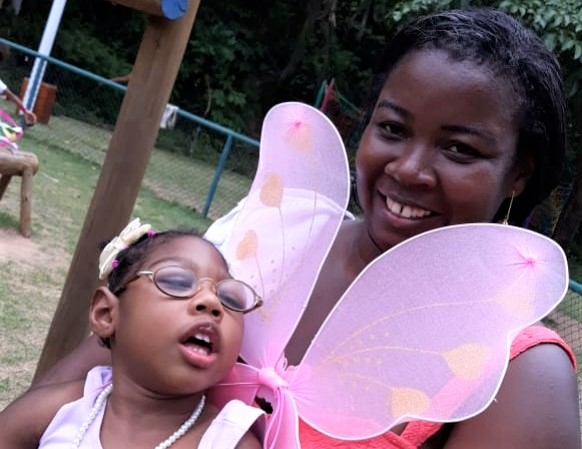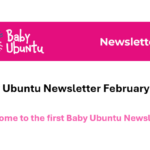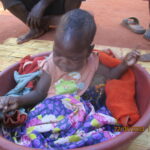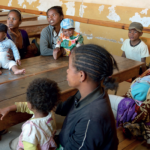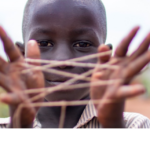This blog has been written from the perspective of Silvia Pinheiro, a mother from Brazil sharing her experience of raising a child with congenital Zika syndrome and becoming a facilitator in a social support program which provided her the coping skills to deal with her distress.
I have never felt more alone. Before motherhood, I had a job that I was excited about, and I did not want to be a mother. Now, I have a baby diagnosed with congenital Zika syndrome who cries all the time. It’s difficult to change her nappy and we are alone all day, just the two of us. My baby starts having seizures and I remember what the doctors said about her small head and needing to see a neurologist. But, that’s where ‘crazy’ people go, not babies. I am alone and I feel like a useless mother. I love my baby but I have lost my job and I worry about money; I feel depressed. I don’t know anyone else like me.
Things are a little bit more peaceful when my daughter listens to the music that she likes; it calms her down. I only feel more comfortable in these tiny moments. A whole year passes without help. I have my husband, but as a mother I am alone. I worry about my baby’s difficulties. I can’t return to my job. There is no one I can ask for help. I go to medical appointments with my child, but no one asks about me. No one cares about the person caring for the child; it is all about the child with disabilities.
The Juntos Programme
I am asked to lead a group of parents of children with disabilities called ‘Juntos’, which means ‘together’. I am lost and I am only a mother, but maybe this will help other families feel less alone than I feel. I meet others who are like me. We have feelings and needs, but usually no one talks about them, only about our children.Together we learn practical things for our children. We share what we find helpful and we share our difficulties, and we have time to talk. This can be an emotional time, but we listen and our voices are heard. I am no longer alone; I feel listened to and valued.
During the first year, I felt that something was missing, something that directly involved me, which made me feel useful. Something not only for me, but for those who experience the same things that I do. So, the Juntos Programme arrived like a gift. It aims to help us, carers and families of children with congenital Zika syndrome, to understand our children and widen our support networks, so that others in our communities can help care for our child and seek ways to guarantee that our rights are respected.
The Juntos Programme valued my carer “knowledge” and put me on the same level as a therapist. In this group programme, neither carers, nor therapists “know more”, their different knowledge is valued and each complements the other in the form of bi-directional learning.
Being a facilitator on the Juntos Programme gave me the opportunity to meet other families of children with congenital Zika syndrome, who I didn’t know, but who experience situations very similar to mine. Facilitating each session means sharing feelings that are not always understood by someone who isn’t in the same situation. I have the chance to motivate other carers to play with their children, to go to public spaces and to overcome the barriers of prejudice, as well as to learn a lot by listening to each other’s experiences. This is the Juntos Programme: families who share knowledge and grow because of it!
Visit our YouTube channel for more personal stories and journeys of families caring for children with congenital Zika syndrome.
Launch of the Ubuntu Hub
Ubuntu is a Nguni Bantu (Zulu) term which can be translated as “humanity towards others”, and is often used to mean “the belief in a universal bond of sharing that connects all humanity”. This principle is at the very core of our values. Ubuntu’s aim is to help improve the lives of children with developmental disabilities, and their families. We are a nonprofit research and educational hub based in the International Centre for Evidence in Disability at the London School of Hygiene & Tropical Medicine.
As part of our work, we collaborate closely with three caregiver groups: GTKCP (Getting to Know Cerebral Palsy), ABaANA Early Intervention Programme and Juntos. This collaboration, together with families that are part of the caregiver groups, group facilitators, and local, regional and international researchers, makes up Ubuntu. We deliver programmes which allow carers to participate in facilitated sessions that aim to :
- Promote the wellbeing of children with developmental disabilities and their families.
- Increase their understanding of child development, health, education and their rights
- Help them build on existing skills, and learn new ones
- Increase mutual support
- Bring them in contact with community services and resources
On Tuesday 26th March we hosted an event at the London School of Hygiene & Tropical Medicine launching a new approach to supporting families and children with disabilities. The session was recorded and is available to view here.
For further information and resources about the Juntos programme please see: www.ubuntu-hub.org or email tracey.smythe@lshtm.ac.uk.
